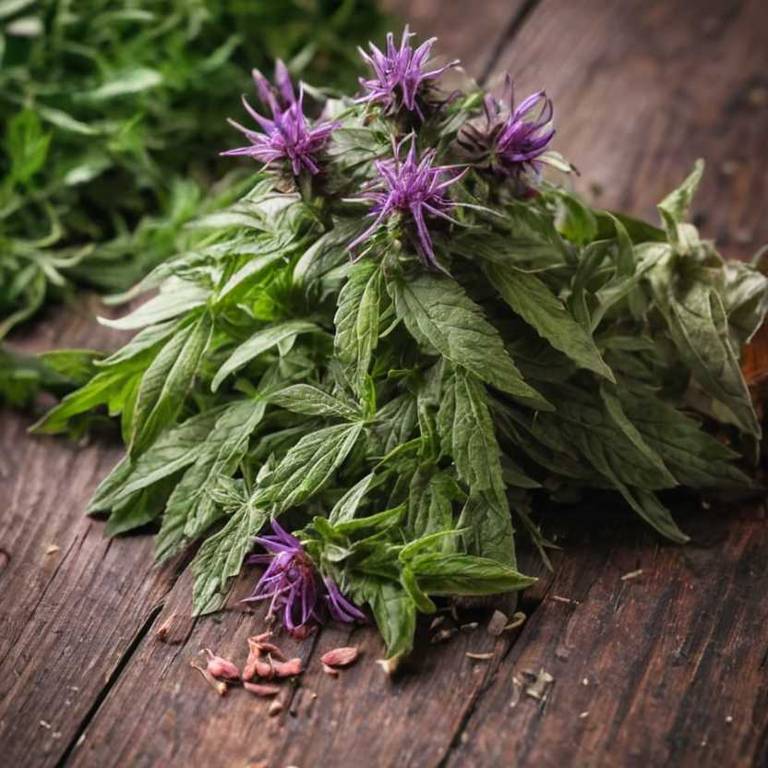By Leen Randell
Updated: Jul 06, 2024
10 Health Benefits Of Monarda Didyma (Bee Balm)

Monarda didyma, also known as bee balm, has health benefits such as soothing digestive issues and reducing inflammation due to its antiseptic and anti-inflammatory properties.
Its essential oils, including thymol and carvacrol, have been shown to ease digestive discomfort and relieve fever.
By consuming bee balm tea or applying its oils topically, individuals can experience relief from ailments and improve their overall well-being, enhancing their quality of life.
This article explains in details the 10 best health benefits of Monarda didyma.
1. Reduces inflammation
Monarda didyma reduces inflammation because of its unique combination of bioactive compounds.
The herb contains a significant amount of rosmarinic acid, a potent antioxidant that inhibits the production of pro-inflammatory enzymes and cytokines. Additionally, bee balm's flavonoids and phenolic acids have been shown to exhibit anti-inflammatory properties, which help to alleviate inflammation and reduce pain.
These properties make Monarda didyma a valuable natural remedy for treating conditions such as arthritis, gout, and other inflammatory disorders.
2. Soothes digestive issues
Monarda didyma soothes digestive issues because of its natural antispasmodic and anti-inflammatory properties.
The essential oils present in the plant, such as citronellal and geraniol, have been shown to relax the muscles in the digestive tract, reducing symptoms like cramps, bloating, and diarrhea.
Additionally, bee balm's flavonoids may help heal and protect the mucous membranes lining the gut, further alleviating digestive discomfort.
3. Alleviates headaches
Monarda didyma alleviates headaches because of its unique combination of volatile oils and flavonoids.
The plant's essential oil, containing compounds like thymol and citral, has anti-inflammatory properties that help reduce pain and tension in the head and neck.
Additionally, the flavonoids present in bee balm, such as kaempferol and quercetin, have been shown to possess potent antioxidant and anti-inflammatory activities, further contributing to its analgesic effects.
4. Eases respiratory symptoms
Monarda didyma eases respiratory symptoms because of its potent anti-inflammatory and expectorant properties.
The herb's essential oils, particularly thymol and terpenes, help to reduce inflammation in the airways and lungs, making it easier to breathe. Additionally, bee balm's expectorant properties help to loosen and clear out mucus, relieving congestion and coughs associated with respiratory issues such as bronchitis, asthma, and allergies.
This natural remedy provides gentle yet effective relief for those suffering from respiratory distress.
5. Acts as natural antibiotic
Monarda didyma acts as a natural antibiotic because it contains bioactive compounds such as triterpenoids and phenolic acids.
These compounds exhibit antimicrobial properties, which inhibit the growth of certain bacteria, viruses, and fungi.
The leaves and flowers of Monarda didyma have been traditionally used in herbal medicine to treat wounds, skin infections, and respiratory issues, leveraging their natural antibacterial and anti-inflammatory effects to promote healing and alleviate symptoms.
6. Combats fungal infections
Monarda didyma combats fungal infections because of its unique combination of bioactive compounds.
The plant's essential oils, terpenoids, and flavonoids exhibit antimicrobial properties that inhibit the growth of fungi, thereby preventing the establishment of invasive pathogens.
Additionally, bee balm's triterpenoids have been shown to disrupt the formation of hyphae, a key component of fungal cell walls, further enhancing its antifungal activity.
7. Relieves menstrual cramps
Monarda didyma relieves menstrual cramps because of its unique blend of volatile oils and flavonoids.
The herb's essential oil, containing thymol and rosmarinic acid, has potent analgesic and anti-inflammatory properties that help to reduce pain and discomfort associated with menstrual cramps. Additionally, the flavonoids present in bee balm have a spasmolytic effect, which can help to relax uterine muscles and alleviate cramping symptoms.
This natural combination makes bee balm a popular herbal remedy for women seeking relief from period-related discomfort.
8. Improves oral health
Monarda didyma improves oral health because of its antimicrobial and anti-inflammatory properties.
The essential oils present in bee balm, such as thymol and eugenol, have been shown to inhibit the growth of bacteria that cause bad breath, gum disease, and tooth decay.
Additionally, bee balm's anti-inflammatory compounds help reduce redness and swelling associated with mouth sores and gum inflammation, promoting a healthy and comfortable oral environment.
9. Boosts immune system
Monarda didyma boosts immune system because it is rich in antioxidants and flavonoids that help fight off infections.
Its essential oils, including thymol and terpenes, possess antimicrobial properties that can combat bacteria, viruses, and fungi. Additionally, bee balm contains vitamins A and C, which are crucial for a healthy immune response.
Consuming bee balm tea or supplements has been shown to increase the production of white blood cells, enhancing the body's natural defense against pathogens and promoting overall wellness.
10. Regulates blood sugar levels
Monarda didyma regulates blood sugar levels because of its unique combination of compounds.
The herb contains flavonoids, which have been shown to increase insulin sensitivity and reduce glucose uptake in the bloodstream.
Additionally, bee balm's iridoid glycosides, such as monardin, have been found to inhibit the activity of enzymes involved in carbohydrate metabolism, further supporting its potential as a natural treatment for diabetes management.